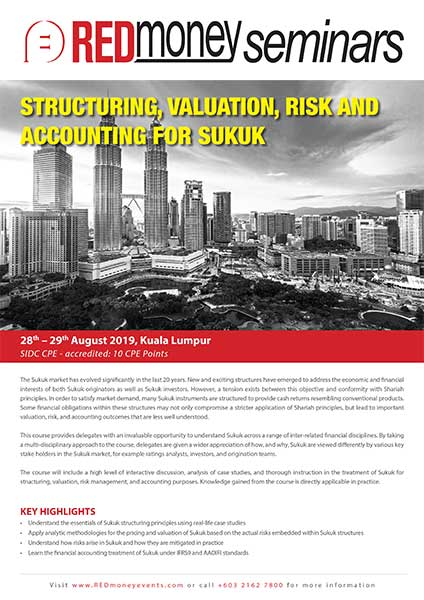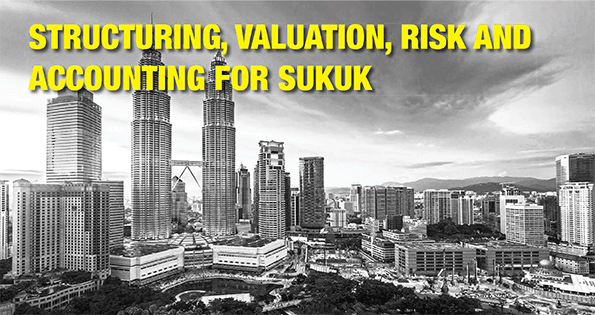About The Seminar
The Sukuk market has evolved significantly in the last 20 years. New and exciting structures have emerged to address the economic and financial interests of both Sukuk originators as well as Sukuk investors. However, a tension exists between this objective, and conformity with Shariah principles. In order to satisfy market demand, many Sukuk are structured to provide cash returns resembling conventional products. Some financial obligations within these structures may not only compromise a stricter application of Shariah principles, but lead to important valuation, risk, and accounting outcomes that are less well understood.
This course provides delegates with an invaluable opportunity to understand Sukuk across a range of inter-related financial disciplines. By taking a multi-disciplinary approach to the course, delegates are given an opportunity to not only complement and expand upon their existing knowledge of Sukuk, but to achieve a wider appreciation of why and how, Sukuk are viewed differently by other key stake holders in the Sukuk market, for example ratings analysts, investors, and origination teams.
The course will include a high level of interactive discussion, analysis of case studies and thorough instruction in the treatment of Sukuk for structuring, valuation, risk management, and accounting purposes. Knowledge gained from the course is directly applicable in practice.
KEY LEARNING OBJECTIVES
By the end of this course delegates will be able to:
- Identify the essentials of Sukuk structuring principles
- Apply analytic methodologies for the pricing and valuation of Sukuk based on the actual risks embedded within Sukuk structures
- Evaluate the various risks in Sukuk and examine how they are mitigated in practice
- Estimate the financial accounting and capital adequacy treatment of Sukuk, including IFRS9 and AAOIFI standards for both Sukuk issuer and investors
- Analyze real-life case studies and examples
- Formulate two Sukuk instruments for hands-on practice
Seminar Agenda
- What Sukuk are and what Sukuk are not
- How are Sukuk different t
- conventional bonds?
- Can Sukuk be traded? If so, what are the Shariah requirements?
- Are Sukuk on- or off-balance sheet?
- Asset-backed Sukuk
- Asset-based Sukuk
- Securitization process based on type of underlying financial instrument
- Fair valuation of Sukuk in the context of market demand and supply
- Portfolio selection: how to choose underlying assets
- Investor demand
- De-risking the originator’s balance sheet
- Tradability requirements
- Performance enhancements
- Irrevocable commitment to repurchase at maturity
- Liquidity facility
- Third party guarantees
- Flexibility
- Embedded call and put options
- Rate resets and break clauses
- Risk reduction
- Excess Spread
- Over-collateralization and tranching
- Role of Takaful
- Pre-funding of Sukuk coupons
- Government of Dubai $5 billion 15-year Sukuk al-Ijarah trust certificates program
- Dar Al- Arkan Real Estate Development $1.8 billion Sukuk al-Wakalah trust certificate program
- Abu Dhabi Islamic Bank $1 billion Additional Tier 1 Capital trust certificates issued 2012 Rawabi Vallianz SAR 1 billion 5-year Sukuk Al-Musharakah due 2021
- Saudi Electricity Company SAR 4.5 billion 40-year Sukuk Al-Istithmar due 2054
- Kingdom Installment Company LLC $18 million Sukuk Al-Istisna’a issued 2006
- Kingdom of Saudi Arabia $9 billion Mudarabah-Murabahah Sukuk issued 2017
- Central Bank of Bahrain Sukuk Al-Salam Certificates
- Ooredoo Tamweel Limited $2 billion 5-year Sukuk Al-Manafa’a trust certificate program
Delegates will be given an opportunity to implement new skills learned on the course by working in groups to structure two Sukuk instruments which meet very different requirements for a company operating in the aviation industry, and an Islamic bank with a retail and a corporate banking business.
- Why Sukuk valuations are not aligned to risks which underlie Sukuk instruments
- What steps are required to derive an accurate valuation of Sukuk?
- Valuing cash flows generated by underlying assets
- Incorporating risk substitution resulting from Sukuk structure
Case Study:Pricing Sukuk Al-Ijarah with real estate underlying assets and a repurchase undertaking
- Risks Arising in Sukuk: Investor
- Murabahah Sukuk
- Salam Sukuk
- Ijarah Sukuk
- Istisnah Sukuk
- Mudarabah Sukuk
- Musharakah Sukuk
- Risks Arising in Sukuk: Originator
- Market liquidity risk in traded Sukuk
- Funding liquidity risk and MTN programs which use Sukuk for Balance Sheet funding
- Liquidity facility: is it necessary?
- Other Types of Risks in Sukuk
- Shariah non-compliance risk
- Accounting and de-recognition risks
- Operational risk
- Project completion risk
- Business risk
Capital Charges for Sukuk Instruments
- What are the accounting standards applicable to Sukuk?
- What are the main issues in accounting for Sukuk?
- How to account for Sukuk under IFRS9 and AAOIFI standards for both the Sukuk issuer and Sukuk investors
Date: 28th – 29th August 2019
Venue: InterContinental Kuala Lumpur
This course is designed to be of most benefit to:
- CFOs, heads of finance and finance officers
- CROs, risk managers, and risk analysts
- Treasurers and treasury managers
- Compliance and audit professionals
- Capital market transaction origination and structuring teams
- Fixed income portfolio and other fund managers
- Ratings agency analysts
- Regulators
Early bird : RM 2,700
Standard : RM3,000 per delegate
2 delegates (5% Discount) : RM2,850 per delegate
3 delegates (15% Discount) : RM2,550 per delegate
4 delegates (25% Discount) : RM2,250 per delegate
5 delegates (30% Discount) : RM2,100 per delegate
If you are looking for an in-house training program or wish to send a group to an existing public program, kindly please contact Andrew Tebbutt at [email protected] or +603 2162 7802.
Learn More
Kindly complete the registration form and email to [email protected] or fax +603 2162 7810
For enquiries please contact:
Normariya Sariman
Account Manager, REDmoney Seminars
[email protected]
Direct Line: +603 2162 7800 ext 44
Ramesh Kalimuthu
Events Sales Director
[email protected]
Direct Line: +603 2162 7800 ext 65
Fax: +603 2162 7810
For sponsorship & speaking opportunities:
Andrew Tebbutt
Managing Director
[email protected]
Direct Line: +603 2162 7802
For marketing and media enquiries
Govina Selvanthran
Marketing Manager
[email protected]
Direct Line: +603 2162 7800 ext 22
Date: 28th – 29th August 2019
Venue: InterContinental Kuala Lumpur
This course is designed to be of most benefit to:
- CFOs, heads of finance and finance officers
- CROs, risk managers, and risk analysts
- Treasurers and treasury managers
- Compliance and audit professionals
- Capital market transaction origination and structuring teams
- Fixed income portfolio and other fund managers
- Ratings agency analysts
- Regulators
Early bird : RM 2,700
Standard : RM3,000 per delegate
2 delegates (5% Discount) : RM2,850 per delegate
3 delegates (15% Discount) : RM2,550 per delegate
4 delegates (25% Discount) : RM2,250 per delegate
5 delegates (30% Discount) : RM2,100 per delegate
If you are looking for an in-house training program or wish to send a group to an existing public program, kindly please contact Andrew Tebbutt at [email protected] or +603 2162 7802./p>
Kindly complete the registration form and email to [email protected] or fax +603 2162 7810
About The Seminar
The Sukuk market has evolved significantly in the last 20 years. New and exciting structures have emerged to address the economic and financial interests of both Sukuk originators as well as Sukuk investors. However, a tension exists between this objective, and conformity with Shariah principles. In order to satisfy market demand, many Sukuk are structured to provide cash returns resembling conventional products. Some financial obligations within these structures may not only compromise a stricter application of Shariah principles, but lead to important valuation, risk, and accounting outcomes that are less well understood.
This course provides delegates with an invaluable opportunity to understand Sukuk across a range of inter-related financial disciplines. By taking a multi-disciplinary approach to the course, delegates are given an opportunity to not only complement and expand upon their existing knowledge of Sukuk, but to achieve a wider appreciation of why and how, Sukuk are viewed differently by other key stake holders in the Sukuk market, for example ratings analysts, investors, and origination teams.
The course will include a high level of interactive discussion, analysis of case studies and thorough instruction in the treatment of Sukuk for structuring, valuation, risk management, and accounting purposes. Knowledge gained from the course is directly applicable in practice.
KEY LEARNING OBJECTIVES
By the end of this course delegates will be able to:
- Identify the essentials of Sukuk structuring principles
- Apply analytic methodologies for the pricing and valuation of Sukuk based on the actual risks embedded within Sukuk structures
- Evaluate the various risks in Sukuk and examine how they are mitigated in practice
- Estimate the financial accounting and capital adequacy treatment of Sukuk, including IFRS9 and AAOIFI standards for both Sukuk issuer and investors
- Analyze real-life case studies and examples
- Formulate two Sukuk instruments for hands-on practice
Seminar Agenda
- What Sukuk are and what Sukuk are not
- How are Sukuk different t
- conventional bonds?
- Can Sukuk be traded? If so, what are the Shariah requirements?
- Are Sukuk on- or off-balance sheet?
- Asset-backed Sukuk
- Asset-based Sukuk
- Securitization process based on type of underlying financial instrument
- Fair valuation of Sukuk in the context of market demand and supply
- Portfolio selection: how to choose underlying assets
- Investor demand
- De-risking the originator’s balance sheet
- Tradability requirements
- Performance enhancements
- Irrevocable commitment to repurchase at maturity
- Liquidity facility
- Third party guarantees
- Flexibility
- Embedded call and put options
- Rate resets and break clauses
- Risk reduction
- Excess Spread
- Over-collateralization and tranching
- Role of Takaful
- Pre-funding of Sukuk coupons
- Government of Dubai $5 billion 15-year Sukuk al-Ijarah trust certificates program
- Dar Al- Arkan Real Estate Development $1.8 billion Sukuk al-Wakalah trust certificate program
- Abu Dhabi Islamic Bank $1 billion Additional Tier 1 Capital trust certificates issued 2012 Rawabi Vallianz SAR 1 billion 5-year Sukuk Al-Musharakah due 2021
- Saudi Electricity Company SAR 4.5 billion 40-year Sukuk Al-Istithmar due 2054
- Kingdom Installment Company LLC $18 million Sukuk Al-Istisna’a issued 2006
- Kingdom of Saudi Arabia $9 billion Mudarabah-Murabahah Sukuk issued 2017
- Central Bank of Bahrain Sukuk Al-Salam Certificates
- Ooredoo Tamweel Limited $2 billion 5-year Sukuk Al-Manafa’a trust certificate program
Delegates will be given an opportunity to implement new skills learned on the course by working in groups to structure two Sukuk instruments which meet very different requirements for a company operating in the aviation industry, and an Islamic bank with a retail and a corporate banking business.
- Why Sukuk valuations are not aligned to risks which underlie Sukuk instruments
- What steps are required to derive an accurate valuation of Sukuk?
- Valuing cash flows generated by underlying assets
- Incorporating risk substitution resulting from Sukuk structure
Case Study:Pricing Sukuk Al-Ijarah with real estate underlying assets and a repurchase undertaking
- Risks Arising in Sukuk: Investor
- Murabahah Sukuk
- Salam Sukuk
- Ijarah Sukuk
- Istisnah Sukuk
- Mudarabah Sukuk
- Musharakah Sukuk
- Risks Arising in Sukuk: Originator
- Market liquidity risk in traded Sukuk
- Funding liquidity risk and MTN programs which use Sukuk for Balance Sheet funding
- Liquidity facility: is it necessary?
- Other Types of Risks in Sukuk
- Shariah non-compliance risk
- Accounting and de-recognition risks
- Operational risk
- Project completion risk
- Business risk
Capital Charges for Sukuk Instruments
- What are the accounting standards applicable to Sukuk?
- What are the main issues in accounting for Sukuk?
- How to account for Sukuk under IFRS9 and AAOIFI standards for both the Sukuk issuer and Sukuk investors
Seminar Speaker

Dr. Ken Baldwin
Former Director Financial Policies & Planning, Islamic Development Bank
Dr. Ken Baldwin has worked as a practitioner in banking and finance for over 25 years in senior positions spanning the front and middle offices. Having graduated from Oxford University with a first-class honors degree in Physics in 1989, he qualified as a Chartered Accountant with PWC, before joining UBS, and then later Credit Suisse, in derivatives risk and control functions based in London.
He gained a PhD in the microeconomic theory of risk sharing in Islamic contracts, and worked in the GCC for 15 years in Islamic retail and Islamic investment banks. Whilst at Abu Dhabi Islamic Bank, Dr. Ken built an ALM analytic technology platform capable of capturing liquidity and interest rate risks inherent in the many varied Islamic financing products used at retail and corporate levels. He then moved to take up the position of MENA Regional Head of Quantitative Analysis for Citigroup. At Citicorp, Dr. Ken worked on structuring complex products used by Gulf-regional corporations to hedge FX and interest risks. Still residing in Bahrain, Dr. Ken then joined Investcorp, where he worked on the risk due diligence of corporate private equity and real estate private equity transactions and portfolio management. After leaving Investcorp, he set up the risk management department for venture capital bank, providing Basel III compliance and deal analysis for the bank. He then operationalized a new Islamic investment bank as its Chief Operating Officer for 3 years, before his most recent industry role at the Islamic Development Bank, where he set up and ran a new department tasked with developing Financial Policies and Planning underpinned by robust financial analytic tools and methodologies designed specifically for the IDB. Dr. Ken is currently a senior university lecturer in finance in the UK. He has published quantitative finance articles in peer-reviewed academic journals including the Journal of Risk, and during his earlier career, taught CFA and FRM professional certifications as a pastime for the Bahrain Institute of Banking and Finance.
Ken is a British Muslim.
For enquiries please contact:
Normariya Sariman
Account Manager, REDmoney Seminars
[email protected]
Direct Line: +603 2162 7800 ext 44
Ramesh Kalimuthu
Events Sales Director
[email protected]
Direct Line: +603 2162 7800 ext 65
Fax: +603 2162 7810
For sponsorship & speaking opportunities:
Andrew Tebbutt
Managing Director
[email protected]
Direct Line: +603 2162 7802
For marketing and media enquiries
Govina Selvanthran
Marketing Manager
[email protected]
Direct Line: +603 2162 7800 ext 22

 Structuring, Valuation, Risk and Accounting for Sukuk
Structuring, Valuation, Risk and Accounting for Sukuk
